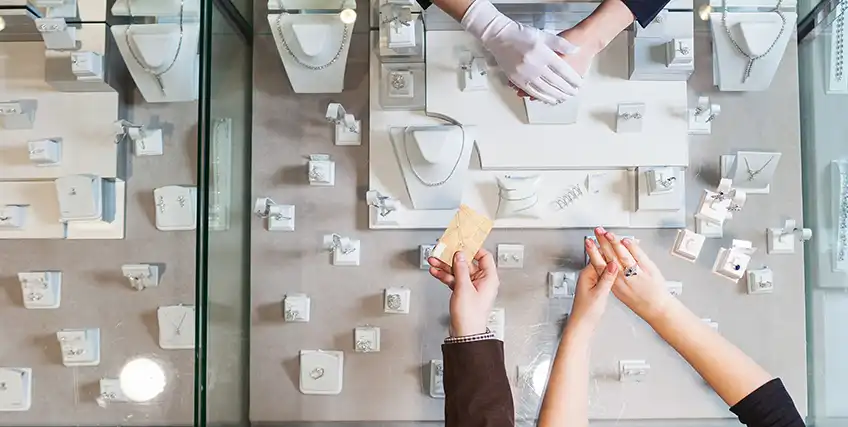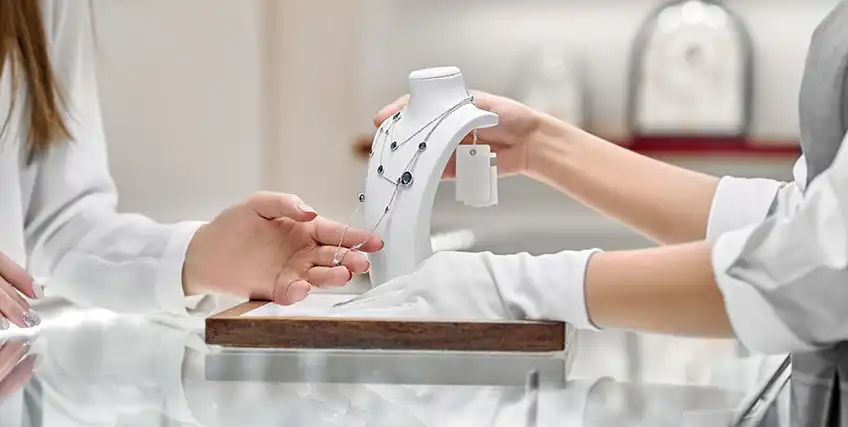Merchant Cash Advances: Are They Right for Jewelry Businesses?
March 25, 2025 | Last Updated on: March 26, 2025

The jewelry industry is highly competitive, with traditional jewelers, wholesalers, pawn shops, private sellers, and other retailers all jockeying for position in a $353 billion industry. Small jewelry businesses often have to compete with national brands and may struggle during economic slowdowns when consumers have less disposable income.
The jewelry business can be feast or famine at times, so you may need financing through a jewelry store loan when cash flow and working capital are limited. If you want to get a loan on jewelry, you’ll have to meet eligibility requirements to get a loan offer — which means a credit check — and you’ll likely have to offer significant collateral, usually in the form of valuable inventory.
A merchant cash advance (MCA) is a more flexible, accessible alternative than jewelry loans for many small businesses.
In this article:
- How to get a loan on jewelry without going through the traditional application process and putting up collateral.
- Why merchant cash advances offer more flexible alternatives than jewelry collateral loans.
- How to scale a jewelry business using small business loans and cash advances like MCAs.
What is a merchant cash advance?
A merchant cash advance is a commercial agreement between a provider and a business that offers a cash advance in exchange for future debit and credit card sales. Importantly, MCAs are not loans as they’re not regulated and offered by private businesses rather than financial institutions.
These arrangements tend to be much faster than the typical loan process, with some operations capable of delivering funds on the same day you apply. If you need to get a loan on jewelry and have been exploring collateral loans against your inventory of Cartier, Patek Philippe, Rolex, and other fine jewelry, MCAs offer you access to quick cash without risking losing this jewelry if you default, like you would with a secured loan.
How does a merchant cash advance work?
It can be tempting to compare MCAs to short-term loans due to their typically short repayment periods of less than a year, but they function quite differently. You don’t make monthly payments on an MCA. Instead, the provider takes a percentage of your daily or weekly credit card sales until you have repaid the advance amount, plus a premium determined by a factor rate.
Factor rates are multipliers, usually between 1.1 and 1.5, applied to the advance to determine a final repayment amount. Like an interest rate assessed on a principal loan amount, a factor rate determines the total cost of the loan that you must repay within the period.
For example, say you get an advance of $10,000 with a factor rate of 1.4:
- 1.4 x 10,000 = a total repayment amount of $14,000
- You’ll repay the loan based on daily or weekly credit card proceeds, until you reach $14,000 or the term period comes to an end, upon which the full amount comes due immediately.
As they usually take payments as a percentage of credit card sales, MCAs can be good options for designer jewelry businesses that process large purchases with credit cards. However, pawn shops and pawnbrokers that primarily deal in cash should probably get a loan on jewelry based on the value of your jewelry since you won’t have an efficient way to repay the MCA provider.
MCAs are usually more expensive than traditional loans in the long run but offer advantages in funding time and accessibility.
Pros and cons of merchant cash advances
If you need to get a loan on jewelry, you have many options, so it’s important to understand the advantages and disadvantages of MCAs.
Pros- Fast funding: The main advantage of MCAs over traditional lenders is that they offer a fast application process that often provides funding in just a few business days.
- Accessible with bad credit: You’ll usually still need some credit history to get an MCA, but qualification requirements are less strict, and you won’t get significantly worse loan terms for bad credit like you would with traditional financing.
- Flexible repayments: Because you only pay when you’re making money, MCAs can help cover costs when business is slow and allow you to repay when it picks back up.
- No collateral: Many traditional lenders will require you to offer high-value jewelry items as collateral to secure a loan. MCAs do not require collateral.
- High cost: Compared to traditional loans, MCAs tend to have a very high annual percentage rate (APR) by the time you’ve paid them off.
- Frequent payments: Making daily or weekly payments can put a dent in your cash flow and make it difficult to grow your business. If you’re not sure how to scale a jewelry business, an MCA will likely not make that easier.
- Won’t build credit: MCA providers do not report to credit bureaus so repaying an MCA will have no impact on your business credit score.
- Limited to credit card businesses: MCA providers typically require repayment through credit card sales, so if you’re primarily a cash-only jewelry operation, it’s better to explore a jewelry store loan or collateral loan.
Why a merchant cash advance makes sense for jewelers
Today, just about any entrepreneur can start a jewelry business online and capitalize on a massive global jewelry demand. That doesn’t mean it’s easy, however, and you’ll still face many challenges when trying to grow and expand your business. Like most businesses, you’ll likely need an influx of capital eventually.
There are a few reasons why an MCA makes a lot of sense for jewelers:
- No collateral: You can get a loan on jewelry, but as we’ve said, you’ll almost definitely have to offer collateral in the form of gemstones, engagement rings, and other high-value jewelry items. That exposes valuable inventory to seizure if you default on the loan, which may effectively run you out of business.
- Fast funding: Jewelry is a high-stakes, fast-moving business, and capitalizing on wholesale opportunities and supplier deals can make a huge difference. An MCA’s fast funding can give you the cash you need to make an impactful purchase for your business.
- Easy repayment: While some people opt to buy jewelry with cash, conventional jewelry stores process a lot of credit card payments. After all, jewelry is expensive! With major credit card charges, you may be able to pay off an MCA faster than other retail businesses.
Alternative Types of Jewelry Store Financing
If you want to get a loan on jewelry, you have many options. MCAs are a good choice if you need cash fast and don’t have strong credit. However, there are several alternatives worth exploring, too:
- Term loans: Conventional loans from banks, credit unions, and online lenders provide a lump sum loan amount upfront in exchange for monthly payments with interest. With good credit and business financials, you can get a competitive interest rate and favorable loan terms.
- SBA loans: The United States Small Business Administration (SBA) offers several loan programs for small businesses. These partially guaranteed loans have lower risk than conventional loans, but stricter qualification and collateral requirements.
- Business lines of credit: A line of credit gives you access to a maximum loan amount, but you only pay interest when you make a withdrawal. Revolving lines of credit allow you to repay the borrowed amount, plus interest, to have access to the full funds again, like a credit card. If you want to get a loan on jewelry, it’s worth exploring both secured and unsecured options.
Final thoughts
Jewelry businesses may have significant operating costs and are susceptible to downturns in consumer spending. They may need access to fast cash occasionally, and a merchant cash advance offers a compelling alternative to a conventional loan. You can get a loan on jewelry, but you’ll often have to put jewelry up as collateral, risking losing it if you default on the loan. MCAs offer a collateral-free, faster funding alternative, but you should always assess the terms and conditions of any MCA contract to ensure they make sense for your business.
FAQS about How to Get a Loan on Jewelry
What are some financing options for jewelry stores?
There are many ways to get financing for a jewelry store. Some options to explore include term loans, lines of credit, and merchant cash advances.
Where can I get a loan on my jewelry?
Many traditional lenders and commercial financiers will provide secured loans based on the value of your jewelry. If you don’t want to get a loan on jewelry, you can also explore unsecured options like merchant cash advances or lines of credit.
Are merchant cash advances good for jewelry stores?
It depends on your particular situation. MCAs are good options for businesses that primarily deal in credit card payments, need fast access to cash, and do not want to go through a credit check or put up collateral to get a loan on jewelry.
How do I get a loan on jewelry with bad credit?
If your poor credit makes it difficult to qualify for traditional financing, you can opt to put up high-value jewelry as collateral to secure a loan or explore alternative unsecured financing options like merchant cash advances or lines of credit.




